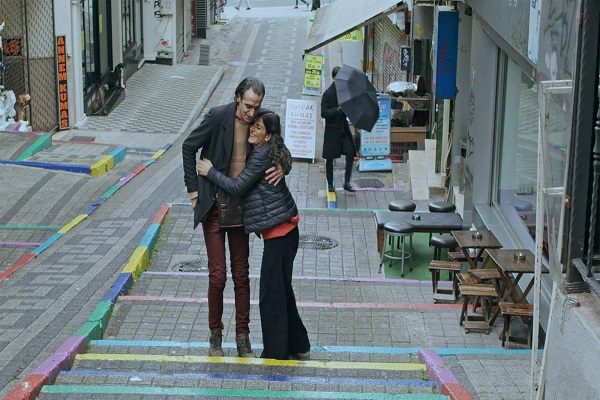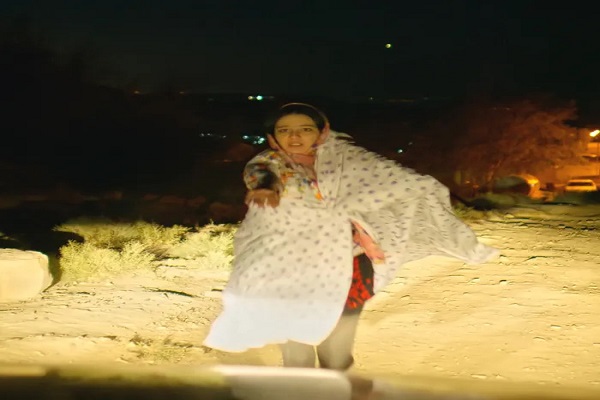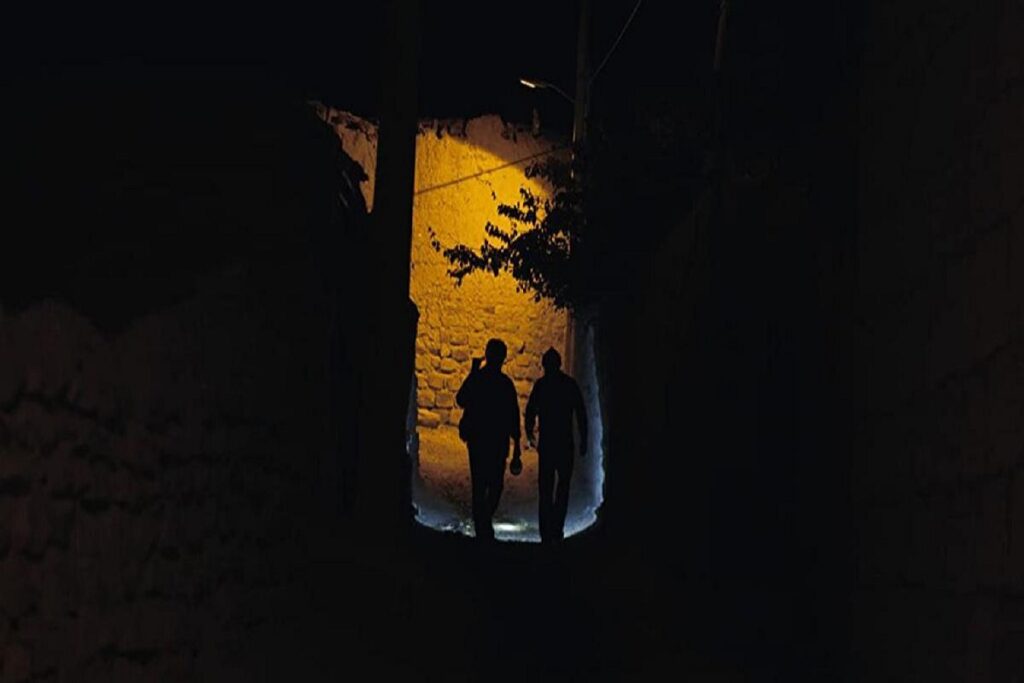Iranian filmmaker Jafar Panahi is not an unknown name in the world of cinema. Viewers across the world are well aware of his indomitable spirit and courage to defy the authoritarian and suppressive Iranian regime and make films as independent filmmakers. He was banned from making films in Iran for 20 years in 2010. However, he does not know how to surrender to the authoritarian regime. Defying all the odds, he kept making films in Iran. He made This Is Not a Film in 2011, Closed Curtain in 2013, Taxi in 2015, and Three Faces in 2018. He was arrested and sentenced to 6 years imprisonment in July 2022. No matter how badly the Iranian government tries to break his indomitable independent artistic spirit, he never stops making films. Despite all those state-sponsored atrocities, he never thinks about leaving his beloved motherland where his artistic spirits and endeavors grew up. In No Bears, he is directing a docu-drama based on an Iranian refugee couple who are staying in Turkey but trying to migrate to Paris. In the other storyline of the film, he gets embroiled in a fallout between the villagers and a couple whose affair does not get approved by the villagers. In the midst of the ordinary Iranian people, Panahi makes his subtle but vivid statement about Iran and its people.
In No Bears, Jafar Panahi plays a version of himself and has rented a room in a remote Iranian Azeri village named Jaban near the Turkey border. From there, he is directing a docu-drama in a Turkish town near the border by instructing his assistant director Reza (Reza Heydari) on the Internet. The docu-drama is about an Iranian refugee couple named Bakhtiar (Bakhtiar Panjeei) and Zara (Mina Kavani) who live in the town but attempt to migrate to Paris. Bakhtiar is able to secure the passport for Zara but not for him. In spite of internet connectivity issues, Panahi decided to rent a room in Jaban instead of directing the film from Tehran because of the close proximity of the village to the Turkish town where filming is taking place and also his 20-year filmmaking ban by the Iranian government.

Reza arranges for smugglers to take Panahi to the filming location in that Turkish town for a few days. However, while crossing the border, Panahi gets scared, steps back, and starts driving back to jaban when a young woman Gozal (Darya Alei) desperately asks him if he has captured her photograph with her boyfriend Solduz (Amir Davari). If village people get to see their photograph, all the hell will break loose and there will be blood. Three villagers meet Panahi in his room and ask for the photograph. They tell him that as per the village tradition, a girl’s umbilical cord is cut in the name of her future husband, and Gozal’s umbilical cord was cut in the name of Jacob (Javad Siyahi). However, her affair with Solduz defies the village tradition and will never be approved by the villagers. Panahi denies capturing their photograph. At night, Solduz meets Panahi and asks him not to reveal the photograph until they elope from the village in a week’s time.
A little boy also confirms that Panahi has captured the photograph of Solduz and Zara. The villagers including the village sheriff (Naser Hashemi) ask Panahi to swear in the name of the Quran that he has not captured the photograph. On the way to the swearing room, a villager offers him tea and tells him that Panahi should swear to avoid any quarrel in the village even though it is a lie. He also tells him that while the city people have problems with the authorities, village people have problems with superstitions. There is no bear in the village. The stories are made up to scare the villagers. In the swearing room, Panahi starts swearing on the video camera instead of the Quran. He directly questions the village tradition of cutting the umbilical cord of a girl during birth in the name of her future husband. The villagers including Jacob fall out with Panahi intensely.
The filming of Panahi’s docu-drama gets a jolt when a furious Zara turns directly to the camera and accuses Panahi of deviating from the agreement of showing only the truth in the film. Zara accuses Bakhtiar of securing a fake passport, and now she will have to travel to Paris all alone. Being frustrated and heartbroken, she commits suicide by jumping into the river. Panahi calls it a cut. His landlord Ghanbar (Vahid Mobasheri) reluctantly asks him to leave the village as per the instructions of the police officials. When Panahi drives away from the village, he sees that Solduz and Gozal have been killed by shooting while crossing the border.

Iranian filmmakers generally take oblique ways because of the oppressive, suppressive, and authoritative government policies. They are monitored and supervised all the time. Many artists including filmmakers are sentenced to rigorous imprisonment. They face and tolerate inhuman torture inside prison. Iranian government exerts all sorts of pressures to crush them. In spite of terrible situations and monstrous treatment, they dare to stand up against the government for the sake of countless innocent civilians. They keep creating their art through mediums like films, literature, and theater. Their indomitable spirits and endeavors don’t know how to stop. Jafar Panahi is a very important symbol of the resistance by Iranian independent artists on behalf of countless innocent citizens against the authoritarian Iranian regime.
In No Bears, Jafar Panahi shows two parallel worlds of oppression and the bondage of ordinary civilians. On one hand, government suppression forces a couple to leave Iran, stay temporarily as refugees in Turkey, and desperately attempt to migrate to Paris. On the other hand, the rural tradition of an Iranian Azeri village forces a couple to elope from their beloved village. In both stories, ordinary civilians are crushed to death. In the 1st story, Bakhtiar and Zara are forced to leave Iran and stay temporarily in a Turkish town as refugees. Even though Bakhtiar is able to secure a passport for Zara, he is not able to secure one for him. Zara gets utterly disappointed and tormented when Bakhtiar arranges a fake passport for him. She accuses Panahi of deviating from the principle of showing only truth in his film. She does not want to leave without Bakhtiar. Heartbroken by Bakhtiar’s lie, she commits suicide by drowning herself in the sea. In the 2nd story, Gozal’s clandestine and illicit affair with Solduz does not get approved by the villagers of Jaban. As per the tradition of the village, Gozal’s umbilical cord was cut in the name of Jacob. So, only Jacob can marry her and not Solduz. While eloping across the border, Gozal and Solduz are shot dead by the border security forces. In No Bears, Panahi vividly shows how a country and society violate civil rights. In the name of tradition and government, ordinary civilians lose freedom and are crushed to death.
Iranian filmmakers portray important and intense subjects in subtle ways. Apparently, their stories look like ordinary representations of simple rural life, tradition, and culture. Their films capture slices of real life amid a calm and quiet rural atmosphere. But, they make strong statements about contemporary Iranian life controlled by the Iranian government. In No Bears, Jafar Panahi makes a very strong statement through a very simple scene. While going to the swearing room, a villager approaches Panahi and warns him about the wild bears on the road. However, a little later, he changes his version and clarifies that there is no bear. Stories are made up to scare people. A very important analogy can be brought here between the bear story and authoritative figures. Those authorities scare people and dictate to them. Ordinary civilians lose basic human rights and freedom amid fear. If they accede to their demands, the authorities dominate and crush them. However, if civilians revolt with incredible courage, there will not be any force indeed to dominate them. When courage and valor win, despair ends. Through this simple scene and dialogue, Panahi invokes courageous resistance and protest against authoritarian, oppressive, and regressive society and government.
Panahi’s No Bears has the structure of contemporary Iranian cinema. It includes simple storylines and dialogues, mostly non-professional actors, natural acting, a rural atmosphere, and deeply impactful messages. Through this simple film, Jafar Panahi efficiently and incredibly captures Iran, its people, and numerous forces to suppress them. Amin Jafari’s camera thrills the viewers during the night scenes near the Iran-Turkey border. No Bears has received widespread critical acclaim across the world. Viewers once again lauded Panahi’s courage and filmmaking endeavors against all the odds. No Bears competed for the prestigious Golden Lion at the 2022 Venice Film Festival where it won the special jury prize.
